Robert Bresson
-
“If Bresson Had Digital Cinematography, What Might He Do?”: DP Alexander Dynan on the Portraits, Inserts and VR Nightmares of The Card Counter
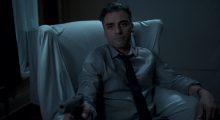
With The Card Counter, Paul Schrader has written another “man in[to] a room”: William Tell (Oscar Isaac), an ex-torturer turned professional poker player, lives hotel to hotel, making each unit his own by wrapping their furniture in his own sterile, white sheets—“essentially bleached muslin,” the film’s DP Alexander Dynan says. A little light went a long way when capturing these whitened rooms on the light-sensitive, medium format Alexa LF camera. Sometimes Dynan lit Isaac journaling with nothing but a bulb wrapped in diffusion—something he could not justify using on First Reformed, as pastor Toller (Ethan Hawke) did not diary near a fabric-covered lamp. […]
by A.E. Hunt on Sep 10, 2021 -
“It Doesn’t Make Sense to Explain Anything”: Angela Schanelec on I Was at Home, But… and Robert Bresson
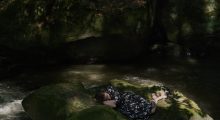
The first time I saw Angela Schanelec speak, there was nothing for her to smile about: at a cartoonishly hostile Q&A for 2016’s The Dreamed Path, she fielded questions like “Was this supposed to take place in an alternate universe where emotions don’t exist?” and admirably didn’t yield an inch. Returning to TIFF, Schanelec was onhand not just for Q&As for her latest, I Was at Home, But… but to introduce a 35mm rep screening of Robert Bresson’s Pickpocket—one of the foundational works from a director whose influence on, and importance for, Schanelec’s work is immediately apparent. Both when I interviewed her […]
by Vadim Rizov on Oct 2, 2019 -
Au Hasard Balthazar, Midnight Cowboy and Of Unknown Origin: Jim Hemphill’s Weekend Viewing Recommendations

Jean-Luc Godard called Robert Bresson’s Au Hasard Balthazar “the world in an hour and a half,” and revisiting the film over 50 years after its release, it’s hard to disagree. There’s not a lot of plot in the conventional sense; Bresson simply follows the life of a donkey as he passes through various owners and uses the animal as a linking device between episodes depicting the human condition in all its variety — though he does tend toward the darker side of the emotional spectrum. For all the talk of salvation and transcendence in Bresson’s films that has been going […]
by Jim Hemphill on Jun 1, 2018 -
L’Argent, The Quiet American, and Charles Bronson: Jim Hemphill’s Home Video Picks
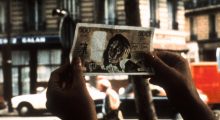
Robert Bresson’s L’Argent (1983) is the kind of final film any director would kill to have on his or her resume, a beautifully distilled summation of Bresson’s preoccupations and techniques that nevertheless strikes out in fascinating new directions. It’s simultaneously the director’s most empathetic film and his bleakest, a wrenching study of how a series of slight moral lapses creates a snowball effect of tragedy that leads to imprisonment and mass murder. Using a late Tolstoy novella as his source material, Bresson depicts the path of a counterfeit bill as it changes hands and inexorably alters the lives of those […]
by Jim Hemphill on Sep 8, 2017 -
Watch: :: kogonada’s Video Essay on Bresson’s Doors, Once There Was Everything
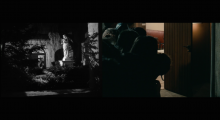
In this video essay, :: kogonada returns to the films of Robert Bresson (which he previously explored in this video essay on the director’s use of hands), this time looking at his use of doors.
by Filmmaker Staff on Aug 16, 2017 -
Watch: Robert Bresson, Less is More
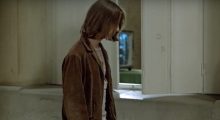
For the uninitiated, Robert Bresson can seem like one of the more forbidding of the all-time great directors. But his work has a visual precision, narrative economy and compelling worldview that remain absolutely transfixing today. In his latest video essay, which itself clocks in at an economical seven minutes, Julian Palmer (aka The Discarded Image) isolates and comments upon several of the most important elements of the Bressonian style, making it a great intro for beginners. If you’d like to learn more about The Discarded Image, and to possibly support further videos, check out the Patreon page.
by Scott Macaulay on Aug 7, 2017 -
Watch: “L’argent, A to Z”
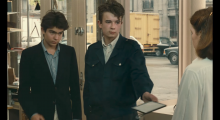
James Quandt analyzes Robert Bresson’s themes and motifs in this video essay on L’argent, which just joined the Criterion Collection last month.
by Cliff Benfield on Aug 3, 2017 -
Currents and Currencies

Ophélia Claude Chabrol was the first member of the Cahiers du Cinema crowd to direct a feature film with Le Beau Serge in 1958, and he scored the first box-office hit of the French New Wave with his second movie, Les Cousins (1959). Yet it took almost another 10 years for him to hit his commercial and critical stride with a series of thrillers (most notably La Femme Infidele, La Rupture and Le Boucher) that would firmly establish Chabrol as the most reliable genre stylist of his generation. In between were a series of flops and for-hire assignments, all of […]
by Filmmaker Staff on Jun 16, 2017 -
Robert Bresson x 2 via NYRB Classics

NYRB Classics is not only reissuing Robert Bresson’s Notes on the Cinematograph but publishing Bresson on Bresson, a freshly translated interview collection. While the imprint’s never published a straight-up film book before, the former isn’t that eyebrow-raising: Bresson’s slender volume of koan-like declarations has been a fetish object outside of Film World since initial publication. Bresson on Bresson, though, is a different proposition. Interview collections (like the Conversations with Filmmakers series published by the University of Mississippi) are both valuable and inherently redundant, as subjects inevitably are forced to give the same answers over and over through the years. The interviews aren’t trimmed down […]
by Vadim Rizov on Nov 4, 2016 -
Super 8: Randomly Accessed Memories
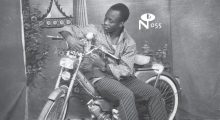
Kerry James Marshall: Mastry Running from Oct. 25 to Jan. 29 at the Met Breuer — the Metropolitan’s new space for contemporary art, in the building formerly occupied by the Whitney — this is the largest museum exhibition to date of Kerry James Marshall. Marshall, whose work since the early ’80s has encompassed painting and sculpture, has returned repeatedly to questions of African-American representation and identity. This exhibition will predominantly focus on his paintings (72 in all) and is complemented by a sidebar exhibition curated by Marshall from the Met’s holdings rounding up his many and varied influences. Belle Époque in Upper Volta […]
by Filmmaker Staff on Oct 20, 2016
